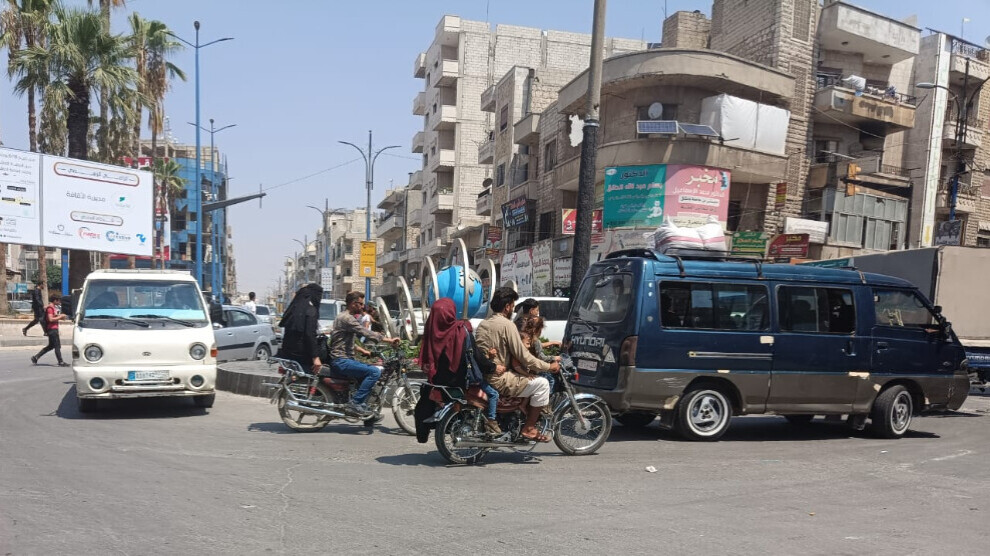Crimes of "Honor" in Idlib Amid Lack of Protection and the Complicity of Traditions
In the Syrian city of Idlib, controlled by the jihadist group Hay’at Tahrir al-Sham, scenes of killings under the pretext of “honor” are repeated, revealing a deep-rooted social crisis that extends beyond individual crimes.

Asinat Mohammed
Idlib — The city of Idlib, Syria, is witnessing a disturbing rise in the killing of women under the guise of “honor,” amid the absence of legal protection and the persistence of outdated traditions and customs that provide social cover for perpetrators of such crimes.
On the morning of October 10, Idlib witnessed a double murder in al-Hamamah Square, claiming the lives of Salsabil Ido and Mohammad Khaled Haj Hassan. The crime was committed under the pretext of “honor,” after one of Salsabil’s relatives informed her cousins of her whereabouts, leading to her being lured and brutally killed.
According to sources from our agency, Salsabil Ido had been trying to escape marital violence and family rejection. Her cousin, who committed the murder in the name of “honor,” highlights a wider phenomenon threatening women across Syria — particularly in Idlib.
Just days later, Shaimaa al-Zaabi was killed by her brother after attempting to flee a forced marriage to Damascus. Both crimes reflect a deeply troubled social reality where concepts like “honor” are used to justify violence against women amid the absence of legal protection, the persistence of tribal customs, and societal silence.
Violence Without Accountability
Thirty-one-year-old Salsabil Ido, who had returned from Germany six years earlier, dreamed of a stable life after years away from her hometown. However, life was far from kind to her. She suffered continuous physical and psychological abuse from her husband, which drove her to seek refuge with her family, according to one of her relatives who requested anonymity for security reasons.
The source explained that Salsabil’s family refused to take her back out of fear of the “social shame” associated with divorce, despite being fully aware of her suffering. This pushed her to secretly plan a return to Germany, where she held permanent residency. However, she received no support from anyone, near or far.
In desperation, she sought help from her relative, Mohammad Haj Hassan, to reach her aunt’s home in Idlib as a step toward traveling to Lebanon to visit the German embassy. But the trust she placed in him proved fatal — after helping her, he informed her cousins of her location, thinking he was acting in good faith. Both became victims of a brutal ambush: Mohammad was slaughtered and shot, while Salsabil was executed by gunfire.
This heinous act is a stark example of so-called “honor crimes,” which went unpunished by authorities already implicated in multiple human rights violations. Hay’at Tahrir al-Sham’s record is rife with violence and killings of women, compounded by traditional social norms that offer justification for perpetrators in certain areas.
Death or Forced Marriage
Shaimaa al-Zaabi, aged 22, fared no better when she too was murdered under the pretext of “honor” after attempting to escape a forced marriage to Damascus earlier this month.
Shaimaa lived under intense family pressure. She dreamed of studying and working, far from the forced marriage her family imposed on her — to her cousin, who was 20 years her senior. Her pursuit of freedom ended in tragedy.
Sources close to the victim told our agency that Shaimaa decided to go to the Syrian capital to enroll in a local university. However, she was caught by a relative who informed her parents of her whereabouts. Three days later, she was lured to a relative’s home, subjected to severe physical abuse, and eventually killed by her brother under the pretext of protecting the “family’s honor.”
The crime went largely unreported in local media out of fear of social retaliation, shocking local human rights activists. It highlighted how traditional norms are exploited to justify violence and murder against women who seek to break free from social constraints.
According to the sources, Shaimaa dreamed of education and a better future, but outdated customs and family pressure surrounding the concept of “honor” turned her into a victim of unwritten laws imposed by force. Ultimately, she lost her life in her search for freedom.
Honor Is No Justification for Violence
Women in such communities live between the hammer of domestic violence and the anvil of tradition. A woman or girl seeking help often faces family rejection or social pressure. Customs of silence and fear frequently prevent victims from turning to the law or the media.
These “honor crimes” expose the failure of institutional protection in many societies, leaving women vulnerable to family and social pressure — often from those closest to them.
The concept of “honor” is frequently used to justify violence or murder, reflecting only the fragility of society in guaranteeing women’s rights and protection. The collective silence surrounding these crimes amounts to complicity. Both local and international actors must exert pressure to enforce justice and protect women from ongoing violations.
The lack of legal accountability in many cases only strengthens the culture of impunity and makes women even more vulnerable — especially in conflict zones or areas dominated by oppressive traditions and outdated customs.
